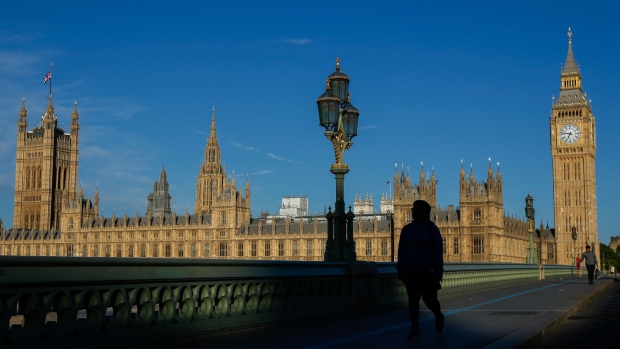Aug 17, 2022
UK Tory Leadership Rivals Attacked Over Unfunded Tax Cuts
, Bloomberg News

(Bloomberg) -- The next UK prime minister faces a worsening fiscal outlook, raising questions about the viability of big tax cuts being promised by the two candidates vying for the job, a leading research group warned.
In a report published Thursday, the Institute for Fiscal Studies said government borrowing next year is set to be £23 billion ($28 billion) higher than forecast due to the impact of soaring inflation on debt and welfare costs, even before any extra money to help struggling consumers and departments has been announced.
Foreign Secretary Liz Truss has pledged almost £40 billion of immediate tax cuts if she succeeds Boris Johnson next month, including reversing a payroll tax increase that took effect in April, suspending the green levy on energy bills and cancelling a planned rise in corporation tax set to take place in 2023. Her rival, former Chancellor Rishi Sunak, has vowed to lower the basic rate of income tax to 16% from 20% by 2029.
“It is hard to square the promises that both Ms. Truss and Mr. Sunak are making to cut taxes over the medium-term with the absence of any specific measures to cut public spending and a presumed desire to manage the nation’s finances responsibly,” said Carl Emmerson, deputy director of the IFS and an author of the report, which was produced in association with Citigroup Inc.
Sunak’s campaign seized on the report to attack the credibility of the tax cut program set out by Truss.
“This drives a coach and horses through Liz’s economic plan,” Sunak’s campaign said in a statement. “It is not credible or Conservative to spend £50bn on tax cuts and pay for them through higher borrowing at a time of high inflation.”
The IFS based its projection on the latest Bank of England forecasts, which show inflation climbing further into double digits and the economy sliding into a recession in the fourth quarter that will last throughout next year.
Debt costs alone in the year starting April 2023 are set to be £54 billion higher than the Office for Budget Responsibility forecast in March because they are tied to the Retail Prices Index, the IFS said. An extra £34 billion of tax revenue, also the result of higher inflation, will only partially offset the damage. In addition, tens of billions of pounds are likely to be needed to support households and top up departmental budgets.
Debt costs will fall the following year if inflation returns to more normal levels, but the pressures on public services will be more acute.
“Higher spending than planned seems almost inevitable,” the IFS said. “And the uncertainty around tax revenues is particularly pronounced, and will crucially depend on the length, depth and pattern of any period of economic weakness.”
©2022 Bloomberg L.P.







